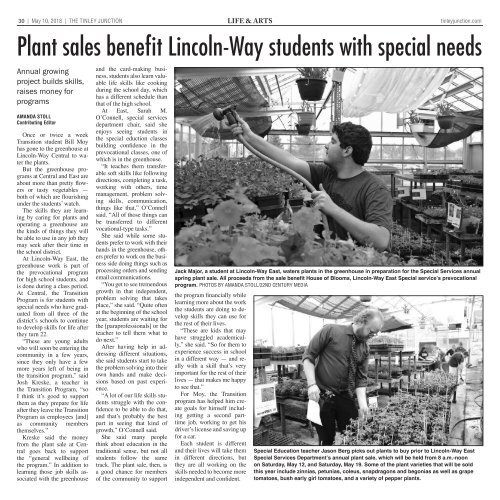TP_051018
You also want an ePaper? Increase the reach of your titles
YUMPU automatically turns print PDFs into web optimized ePapers that Google loves.
30 | May 10, 2018 | The tinley junction Life & Arts<br />
tinleyjunction.com<br />
Plant sales benefit Lincoln-Way students with special needs<br />
Annual growing<br />
project builds skills,<br />
raises money for<br />
programs<br />
Amanda Stoll<br />
Contributing Editor<br />
Once or twice a week<br />
Transition student Bill Moy<br />
has gone to the greenhouse at<br />
Lincoln-Way Central to water<br />
the plants.<br />
But the greenhouse programs<br />
at Central and East are<br />
about more than pretty flowers<br />
or tasty vegetables —<br />
both of which are flourishing<br />
under the students’ watch.<br />
The skills they are learning<br />
by caring for plants and<br />
operating a greenhouse are<br />
the kinds of things they will<br />
be able to use in any job they<br />
may seek after their time in<br />
the school district.<br />
At Lincoln-Way East, the<br />
greenhouse work is part of<br />
the prevocational program<br />
for high school students, and<br />
is done during a class period.<br />
At Central, the Transition<br />
Program is for students with<br />
special needs who have graduated<br />
from all three of the<br />
district’s schools to continue<br />
to develop skills for life after<br />
they turn 22.<br />
“These are young adults<br />
who will soon be entering the<br />
community in a few years,<br />
since they only have a few<br />
more years left of being in<br />
the transition program,” said<br />
Josh Kreske, a teacher in<br />
the Transition Program, “so<br />
I think it’s good to support<br />
them as they prepare for life<br />
after they leave the Transition<br />
Program as employees [and]<br />
as community members<br />
themselves.”<br />
Kreske said the money<br />
from the plant sale at Central<br />
goes back to support<br />
the “general wellbeing of<br />
the program.” In addition to<br />
learning those job skills associated<br />
with the greenhouse<br />
and the card-making business,<br />
students also learn valuable<br />
life skills like cooking<br />
during the school day, which<br />
has a different schedule than<br />
that of the high school.<br />
At East, Sarah M.<br />
O’Connell, special services<br />
department chair, said she<br />
enjoys seeing students in<br />
the special eduction classes<br />
building confidence in the<br />
prevocational classes, one of<br />
which is in the greenhouse.<br />
“It teaches them transferable<br />
soft skills like following<br />
directions, completing a task,<br />
working with others, time<br />
management, problem solving<br />
skills, communication,<br />
things like that,” O’Connell<br />
said. “All of those things can<br />
be transferred to different<br />
vocational-type tasks.”<br />
She said while some students<br />
prefer to work with their<br />
hands in the greenhouse, others<br />
prefer to work on the business<br />
side doing things such as<br />
processing orders and sending<br />
email communications.<br />
“You get to see tremendous<br />
growth in that independent,<br />
problem solving that takes<br />
place,” she said. “Quite often<br />
at the beginning of the school<br />
year, students are waiting for<br />
the [paraprofessionals] or the<br />
teacher to tell them what to<br />
do next.”<br />
After having help in addressing<br />
different situations,<br />
she said students start to take<br />
the problem solving into their<br />
own hands and make decisions<br />
based on past experience.<br />
“A lot of our life skills students<br />
struggle with the confidence<br />
to be able to do that,<br />
and that’s probably the best<br />
part in seeing that kind of<br />
growth,” O’Connell said.<br />
She said many people<br />
think about education in the<br />
traditional sense, but not all<br />
students follow the same<br />
track. The plant sale, then, is<br />
a good chance for members<br />
of the community to support<br />
Jack Major, a student at Lincoln-Way East, waters plants in the greenhouse in preparation for the Special Services annual<br />
spring plant sale. All proceeds from the sale benefit House of Blooms, Lincoln-Way East Special service’s prevocational<br />
program. Photos by Amanda Stoll/22nd Century Media<br />
the program financially while<br />
learning more about the work<br />
the students are doing to develop<br />
skills they can use for<br />
the rest of their lives.<br />
“These are kids that may<br />
have struggled academically,”<br />
she said. “So for them to<br />
experience success in school<br />
in a different way — and really<br />
with a skill that’s very<br />
important for the rest of their<br />
lives — that makes me happy<br />
to see that.”<br />
For Moy, the Transition<br />
program has helped him create<br />
goals for himself including<br />
getting a second parttime<br />
job, working to get his<br />
driver’s license and saving up<br />
for a car.<br />
Each student is different<br />
and their lives will take them<br />
in different directions, but<br />
they are all working on the<br />
skills needed to become more<br />
independent and confident.<br />
Special Education teacher Jason Berg picks out plants to buy prior to Lincoln-Way East<br />
Special Services Department’s annual plant sale, which will be held from 8 a.m.-noon<br />
on Saturday, May 12, and Saturday, May 19. Some of the plant varieties that will be sold<br />
this year include zinnias, petunias, coleus, snapdragons and begonias as well as grape<br />
tomatoes, bush early girl tomatoes, and a variety of pepper plants.


















